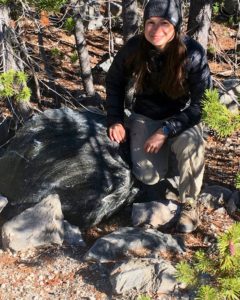 Many students hoping to complete their field camp requirement in the summer of 2020, had their plans derailed by the COVID-19 pandemic. Students were faced with the difficult choice of postponing or venturing into the unknown and attending field camp by the glow of a laptop rather than a campfire.
Many students hoping to complete their field camp requirement in the summer of 2020, had their plans derailed by the COVID-19 pandemic. Students were faced with the difficult choice of postponing or venturing into the unknown and attending field camp by the glow of a laptop rather than a campfire.
To help navigate this unprecedented decision, recipients of GSA’s 2020 J. David Lowell Field Camp Scholarships were given the option to defer their awards or use them to attend a virtual field camp.
Several chose the virtual option. Over the next several weeks, we will be sharing their experiences as they learned to apply their geoscience training in a virtual environment and developed new skills to help them thrive in an increasingly digital world—all the while navigating a difficult and ever-changing situation.
Thank you for your past and continued support of students’ field camp experiences. We realize these are uncertain times for many, but if you would like to make a gift to the J. David Lowell Field Camp Scholarship Program to help students attend field camp, please click DONATE at the top right.
**********************
Selena Kimball attended the University of South Florida’s (USF) virtual field camp, an experience she called the “capstone” of her geology degree. She now feels prepared to continue her academic and professional career.
Where did you attend field camp?
I attended field camp at the University of South Florida, which was converted into a virtual data analysis field camp. The virtual program consisted of six courses that were each one week in length and explored different geologic topics: hydrology, mapping of volcanology, structural mapping, coastal geology, geophysics, and geospatial mapping.
How did COVID-19 affect your experience of field camp?
Because of COVID-19 the geoscience department and the university had all summer classes converted to an online format. The geoscience department at USF made the switch as smooth and accessible as possible to every student by providing laptop computers and the necessary software when needed. Throughout the experience, it was apparent that the switch was necessary to reduce exposure to the virus and maintain a status of safety. Because of the remoteness of the online program, and unfortunately not from the remoteness of the outdoors, meetings on Microsoft Teams were frequent and extensive, allowing for an interactive group setting that would have been provided in non-virtual field camps. Even though my colleagues and I were not in the field for field camps, the online format was organized and completed to the best of everyone’s abilities given the circumstances.
What did receiving the J. David Lowell Field Camp Scholarship mean to you?
Receiving the field camp scholarship meant that I could support myself financially during the six weeks that the full-time field camps occurred. Although a majority of the scholarship went to the cost of tuition, the remaining amount allowed me to focus on my studies. The scholarship gave me the opportunity to produce my best work and truly show everything I have learned throughout my education.
What did that experience teach you about the geosciences, yourself, and your future career?
The virtual field camp experience taught me the importance of using technology as a tool for analyzing, collecting, and organizing data. Additionally, the experience showed me how to use software, such as ArcGIS AppStudio, as a visual aid for communicating scientific data with the general public. The virtual field camp left me feeling more confident in my computer skills, such as coding and figuring out software I’ve never used before. My curiosity for the earth around me and its origins are what led me to a degree in geology. Experiencing field camps, even online, solidified my academic and career choice because it encompasses everything that defines geology as a disciple.
What opportunities did attending field camp provide that you wouldn’t have had otherwise?
The most valuable opportunity I received was learning from an amazing group of professors/TAs from each subdiscipline of the geoscience department and being introduced to valuable data analysis software. For example, computer applications such as ArcGIS Pro, MATLAB, R, and ResIPy were introduced as data analysis tools for geologic and environmental solutions. Google Earth satellite imagery was used to create geologic maps in UTM coordinates and cross sections of folds/faults in Idaho that would have been visited in-field. LiDAR and geophysical topics such as magnetics, seismology, and ground penetrating radar were made familiar. The virtual field camp allowed me to dip my hands into the many subdisciplines of geology and learn the necessary skills and tools needed to perform the job as a professional. Whether it is hydrology, geologic and structural mapping, or geophysics, I now know what would be expected of me in the workforce or when I continue my education in graduate school.
In your opinion, how important is field camp for geoscience students? Why should individuals support field camp opportunities for students?
As a geoscientist, being in-field is as important as analyzing data and investigating the world around you. The field camp experience at University of South Florida provided an alternative experience that was as immersive and intense as an in-field experience, while maintaining a focus on field observations, data analysis, and data/sample collection tools. The field experience, even though unfortunately virtual, was the most enriching and educational experience of completing my degree that will prepare me for furthering my career professionally and academically. Individuals should support field camp opportunities for students because the enrichment and transformation that occurs are just something that a classroom setting cannot provide. Without the support of the GSA scholarship, I would have missed the capstone experience of my geology degree.
